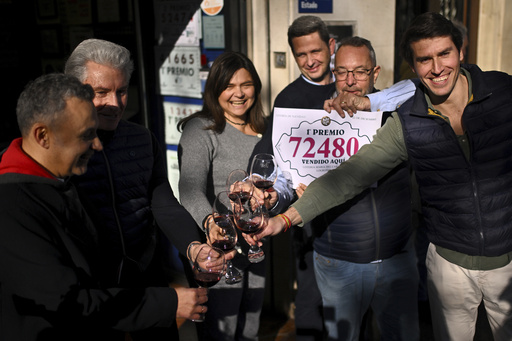
MADRID — For several weeks, the excitement surrounding “El Gordo,” which translates to “The Fat One,” has captivated the people of Spain. Unlike the more traditional arrival of Santa Claus, El Gordo made its appearance a few days before Christmas, specifically on Sunday morning.
El Gordo is the pinnacle of Spain’s renowned Christmas lottery, recognized as one of the world’s largest lotteries in terms of total prize money, despite other lotteries featuring larger individual prizes. This year, the lottery event boasts an impressive pool of 2.7 billion euros, approximately $2.8 billion, with a significant portion awarded in smaller prizes.
A group of ticket holders matching the number 72480 secured the grand prize, which amounts to 400,000 euros or close to $417,000 before taxes. The winning tickets were purchased in Logroño, a city situated in the La Rioja region of northern Spain, famed for its wine production.
The lottery system allows multiple tickets with the same number to be sold across different segments, and each full ticket can be divided into ten shares. This practice of buying and sharing tickets, referred to as “décimos,” is a cherished holiday tradition. Usually, family, friends, and colleagues join forces to purchase tickets, each contributing about 20 euros or around $21.
On Sunday, students from Madrid’s San Ildefonso school took to the stage at the Teatro Real opera house to draw numbers from two spinning globes. They sang the winning numbers for nearly five hours in a melodic format familiar to the Spanish audience. Following the announcement of “El Gordo,” audience members—some dressed as characters like Don Quijote, Christmas elves, and even biblical figures—began to leave the venue, which was broadcast live across the nation.
One enthusiastic participant, María Ángeles, a teacher from Badajoz, shared her experience. She spent hours in line to secure a seat in the opera house with a group of 14 friends and family members who made the trip to Madrid together. “The point of coming to see the lottery is the hope,” she expressed, acknowledging that her group likely won no more than 140 euros or $146 in total.
The lottery is designed to maximize the number of winners, distributing a vast array of smaller prizes alongside 13 major awards, including the prestigious El Gordo prize itself.
In the weeks leading up to the draw, eager participants form long lines outside lottery offices, particularly those known for selling winning tickets in the past. The tradition of Spain’s Christmas lottery dates back to 1812 during the Napoleonic Wars and has largely persisted without interruption, even through the tumult of the Spanish Civil War. Since the beginning, students from the San Ildefonso school have been singing the winning numbers.
Originally established in 1763 as a charity initiative by King Carlos III of the Bourbon dynasty, Spain’s national lottery has evolved to support various charitable causes. Today, it remains a significant fixture in the lives of Spaniards, uniting communities in the spirit of hope and tradition every Christmas season.
